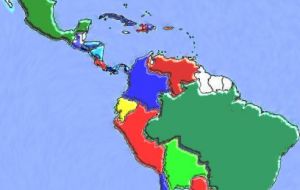MercoPress. South Atlantic News Agency
Spanish investors moderately optimistic about 2008 Latam

Less growth, more inflation, tougher decisions than so far but nothing catastrophic is the 2008 forecast of Spanish businesses that have strong investments in Latinamerica and are planning to further expand their positions.
The Latibex Forum 2008 which met in Madrid believes the situation is less fluid and the horizon cloudier than in 2006 mainly because of the sub prime mortgage crisis in the United States, with losses estimated over 350 billion US dollars and at least two recession quarters. "The Federal Reserve is expected to lower interest rates at least twice in the next six months and we shouldn't be surprised if the Euro reached 1.55 US dollars", said a Spanish financial analyst. The impact for Latinamerica will not be catastrophic, "Brazil has already gone through the test of raising rates to keep inflation but with a slower economy it could be harder". In Argentina the Kirchners "have reinforced the fiscal situation with the unpleasant resource of increasing taxes of booming farm exports, which works in the short term, and maybe there was nothing else to do". "However Cristina Kirchner must bring solutions, but if they continue to blame banks for having "too much money" and demanding lower rates, it's going to be difficult, unless there's a real cap to inflation". In Venezuela which is the worst scenario case, President Chavez could end taking over Spanish companies and banks (Santander and BBVA) if the King does not apologize for having told the Venezuelan leader "to shut up". "It's very simple we don't need Spanish investors and nobody is going to cry about it", warned Chavez in one of his latest diatribes. And why no dramatic scenarios can be expected according to Latibex 2008. Contrary to the nineties most countries in Latinamerica have strong fiscal and international reserves positions, expanding commodities exports although a weaker US dollar could mean that in real value the average overall price of minerals and farm produce could drop 15%. The region has also diversified export markets and even if sales to the US have remained stable in recent years, exports to China and now India have not ceased to expand, which means the region would be less vulnerable to a US recession. Javier Santiso from OECD (Organization for Economic Cooperation and Development) wrote a paper on the advantages and disadvantages of China for Latinamerica. In semi industrialized goods, "Mexico has geographic proximity to the US and thus is more competitive, (than China), particularly in those industries which demand closer interaction between the manufacturer and supplier in short times". However the efficiency and infrastructure of ports in the region must be upgraded, underlines Santiso. Spain has invested in the region on average 7.8 billion Euros annually between 1993 and 2000, falling to 4.3 billion from 2001 to 2006. In this scenario the powerful Spanish telecommunications giant Telefonica is planning to invest between 14 and 16 billion Euros in the next three years. Spain's main oil corporation Repsol's CEO Antonio Brufau argues that "Latinamerica keeps growing at a steady pace in spite of the storm in the north (US) and needs investments. And money will continue to pour in if the institutional framework and transparency are respected". Latinamerica main competitor for Spanish investments remains Eastern Europe, the former Soviet satellites. Spanish banks are also investing heavily in Latinamerica and in a visible way. Santander for example which recently acquired Britain's Abby has become the sponsor of the F 1 McLaren and its two outstanding pilots, Lewis Hamilton and Fernando Alonso. Santander's owner and CEO Emilio Botín was recently in Sao Paulo hoping that the McLaren team would win the 2007 F1 championship. It couldn't be, but has promised to return in 2008 and his bank will also be the main sponsor of Latinamerica's top football clubs trophy, the Libertadores Cup.




Top Comments
Disclaimer & comment rulesCommenting for this story is now closed.
If you have a Facebook account, become a fan and comment on our Facebook Page!